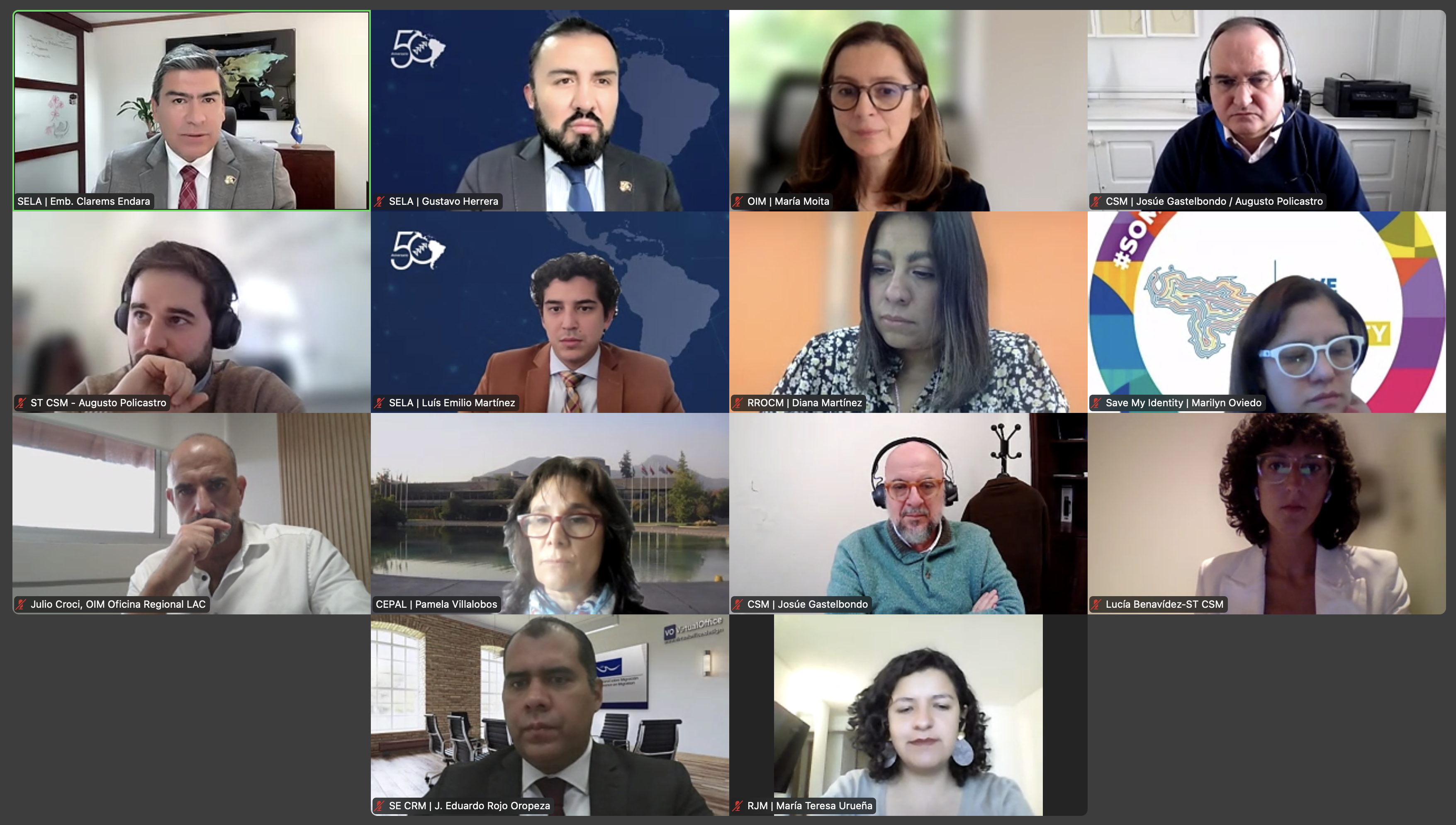
With the firm purpose of promoting a migration agenda focused on people and human rights, the Latin American and Caribbean Economic System (SELA), in collaboration with the Regional Network of Civil Organizations for Migration (RNCOM) and the International Organization for Migration (IOM), held the Discussion panel on the progress and challenges identified in the Second Review of the Global Compact for Safe, Orderly and Regular Migration (GCM), a day that reaffirmed the region’s commitment to a fairer, more inclusive and sustainable migration governance.
During his opening remarks, the Permanent Secretary of SELA, Ambassador Clarems Endara, said that “migration should be an option, never an obligation (…) this premise is the foundation for a more solid, fair and sustainable regional integration.” He added that SELA will continue to promote “spaces for technical and political dialogue such as this one, in order to contribute to a more inclusive, efficient and people-centred migration governance.”
Endara also stressed that ‘it is time to transform our diagnoses and aspirations into concrete actions so that our region is the result of facts and we are a clear global example of migratory integration, but, above all, of profound human integration. ‘ In his speech, he called on the participants to review the lessons learned and challenges with a ’critical and constructive spirit,” and urged them to identify best practices, make the gaps visible and renew the collective commitment to safe, orderly and regular migration.
‘We at SELA will continue to stress the need to address with determination the root causes of migratory movements (…) tackling migration requires more than will: it requires strengthening our institutions, generating reliable data, promoting coherent policies and fostering effective partnerships among governments, civil society, private companies and multilateral organizations,” Ambassador Endara said.
The event also included opening remarks by Maria Moita, Regional Director for Latin America and the Caribbean of the International Organization for Migration (IOM), who stated that “we live in a region marked by migration; no country is exempt from this impact or can see its economy grow without migrants.” She also stressed that “to take advantage of the challenges and opportunities of international cooperation, it is essential to strengthen the management of migration through greater investment in intra-regional cooperation.”
Diana Martínez, Technical Secretary of the Regional Network of Civil Organizations for Migration (RNCOM), stressed that this discussion represents “an opportunity to reflect collectively on the implementation of the pact from a regional, inclusive and evidence-based perspective.”
Participants included more than 90 representatives from at least 35 countries in Latin America, the Caribbean, Europe and North America, including Venezuela, Mexico, Colombia, Ecuador, Peru, Haiti, Argentina, Guatemala, Honduras, El Salvador, the Dominican Republic, Chile, Panama, Nicaragua, Bolivia, Brazil, Spain, Italy, the United States, Guyana, Belize and Suriname.
Three thematic panels were held during the day. Panel I, entitled “Stakeholders’ Report on the Second Review of the PMM”, was attended by Vinicio Sandoval, Director of GMIES and Executive Secretary of RNCOM; Marilyn Oviedo, Focal Point for South America of Save My Identity; and María Teresa Urueña, Rapporteur for the Second Review of the PMM of the Jesuit Migration Network for Latin America and the Caribbean.
In Panel II, Dr. J. Eduardo Rojo Oropeza, Executive Secretary of the Regional Conference on Migration (RCM), spoke on the development of the Global Compact within the framework of this intergovernmental mechanism and highlighted the role of the RCM in regional coordination on migration issues.
Panel III was conducted by the Technical Secretariat of the South American Conference on Migration (CSM), which presented the South American Migration Plan towards Integration 2035, a strategic proposal that aims to guide the region’s efforts towards a structured, supportive and long-term vision of migration integration.
Throughout the discussion panel, the value of the structural contributions of migrants in economic, social, intellectual and human terms was recognized, stressing that their recognition should not only be based on solidarity, but also on justice.
The complete transmission of the discussion is available through SELA’s official channel on YouTube: http://www.youtube.com/live/B-i2KTxEiqc.
The Discussion panel on the progress and challenges identified in the Second Review of the Global Compact for a Safe, Orderly and Regular Migration (PMM) is part of SELA’s Work Programme for 2022-2026, within the programme on Promotion of a Comprehensive Vision of Human Mobility, with the purpose of making better use of the opportunities presented by cooperation among countries of origin, destination and transit, in order to have a positive impact on the development offered by human mobility, understood from a comprehensive vision that involves the socioeconomic development processes of the region. With this effort, SELA reaffirms its role as a facilitator of technical dialogue and regional cooperation, promoting public policies that respond to the contemporary challenges of international migration in Latin America and the Caribbean.
